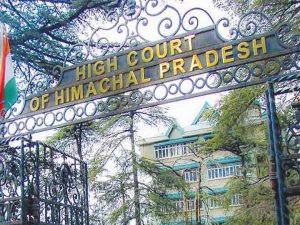 The Himachal Pradesh High Court in the case of SHYAMA POWER INDIA LTD. VERSUS STATE OF H.P. & ORS. vide Case No.- CWP No. 6990 of 2025 dated 19.06.2025, held that a payment made under protest does not constitute an admission of liability under the GST Act. It is merely a precautionary measure by the taxpayer to avoid coercive recovery while reserving the right to challenge the levy. Further, held that Section 74 requires evidence-based determination of liability; suspicion or audit notes are insufficient.
The Himachal Pradesh High Court in the case of SHYAMA POWER INDIA LTD. VERSUS STATE OF H.P. & ORS. vide Case No.- CWP No. 6990 of 2025 dated 19.06.2025, held that a payment made under protest does not constitute an admission of liability under the GST Act. It is merely a precautionary measure by the taxpayer to avoid coercive recovery while reserving the right to challenge the levy. Further, held that Section 74 requires evidence-based determination of liability; suspicion or audit notes are insufficient.
Facts of the Case: In this case, the petitioner is engaged in construction of transmission lines and sub-stations. The audit under Section 65 was initiated for FY 2017–18 and 2018–19. However, Audit memos raised objections regarding alleged wrong availment of ITC of ₹1.11 crore on purchases from 3 Delhi/UP-based suppliers. The petitioner submitted detailed documentary replies including bank statements, purchase orders, transporter affidavits, and reconciliations.
Despite this, the department issued a discrepancy notice under Rule 101(4), directing reversal of ITC with interest and penalty. Facing continuous pressure, the petitioner reversed the ITC under protest on 31.03.2023 using DRC-03 (partly in cash and partly through credit). Subsequently on 02.12.2023, the department passed a final order under Section 74, levying penalty and interest on the ground that tax had already been “admitted” and deposited. The was unable to dispute the tax demand in appeal, since DRC-07 showed nil tax liability (treated as admitted), and thus had no option but to file a writ petition.
The present writ petition was filed to quash the order passed under Section 74 of the HP GST Act, whereby interest of ₹1.32 crore and penalty of ₹1.11 crore were imposed. Direction to issue fresh DRC-07 incorporating only the disputed ITC amount of ₹1.11 crore, to enable appellate remedy. Also, a declaration that the ITC reversed was valid and legally allowable, and refund of the ITC amount deposited under protest.
Issue: Whether payment under protest can be construed as admission of liability under the GST law? Whether the order under Section 74 was passed without due inquiry and was liable to be set aside?
Held that: The Court observed that the adjudicating authority failed to apply its independent mind and wrongly based the entire Section 74 order on the DRC-03 payment and audit observations. No investigation or verification was undertaken into the alleged ineligibility of ITC. The petitioner had submitted detailed documentary evidence—invoices, transporter affidavits, bank statements, purchase orders, reconciliation of GSTR-2A—which were completely ignored. The audit report itself (ADT-02) recorded that there was no short payment of tax and no additional tax or cess was payable, further contradicting the final order. Therefore, The authority’s approach was mechanical and arbitrary, and failed to meet the standard of adjudication required under Section 74, which necessitates finding fraud or suppression with intent to evade tax.
Further, the Court stated that the petitioner had deposited ₹1,11,45,134/- via Form DRC-03 under clear protest. The adjudicating authority treated this payment as voluntary and conclusive, and proceeded to impose interest and penalty under Section 74. The Court cited Black’s Law Dictionary definition of “under protest,” which refers to a disputed payment made unwillingly, with the right to recover or challenge retained. Therefore, the Court found that the mere act of deposit does not bar the petitioner from contesting the underlying demand. Hence, treating DRC-03 deposits as admissions of tax liability in the absence of adjudication violates natural justice and circumvents statutory safeguards under the GST regime.
The Court held that Section 74 order dated 02.12.2023 was unsustainable in law, being based on non-adjudicated, disputed tax liability. And imposition of interest and penalty on such disputed ITC, solely because of a deposit under protest, was legally impermissible.
The Court quashed the order dated 02.12.2023 under Section 74 of HP GST Act, 2017. Also, enabled the petitioner to file an appeal before the Appellate Authority. Allowed the petitioner to raise all legal and factual grounds, including those not covered in the present writ petition.
To read the complete judgment 2025 Taxo.online 1213


